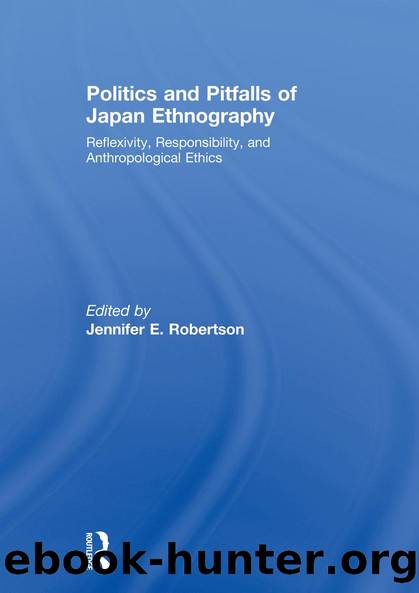Politics and Pitfalls of Japan Ethnography by Jennifer Robertson

Author:Jennifer Robertson [Robertson, Jennifer]
Language: eng
Format: epub
Tags: Nonfiction, History, Asian, Japan, Civilization, Social & Cultural Studies, Social Science, Anthropology
ISBN: 9781317967576
Google: r-gBQAAACAAJ
Publisher: Taylor and Francis
Published: 2013-10-18T04:00:00+00:00
Whatâs in a Name?
The AAAâs current code of ethics (1998) states that anthropologists should give their âhosts/providersâ the choice of whether they wish to have their anonymity protected, or instead, whether they would like to have their real names used in professional presentations and publications that result from the research.28 In practice, however, with IRB restrictions mounting as universitiesâ fears of lawsuits continue to grow, it is becoming more and more difficult to use actual names rather than pseudonyms. In fact, according to friends and colleagues in anthropology and other social sciences, this issue is causing some of the greatest frustration, consternation, and delays in the approval process when dealing with IRB committees. One friend and colleague, for instance, related that despite her subjectsâ emphatic requests to have their names included in her work â for both personal and political reasons â her IRB committee members tried in every way possible to dissuade her from doing so. Ultimately, after several weeks of back-and-forths, they made the requirements for written consent so extensive and time consuming that it became a ridiculous amount of work for my friend and a very uncomfortable and chilling bureaucratic ordeal for her subjects. Separate from these recent IRB dictates, however, it has for some time now been common practice in anthropology to protect the identities of our informants. There are many good reasons for doing so, and I will review some of those shortly. I contend, however, that the use of pseudonyms has become such second nature to the majority of scholars in anthropology that we may be overlooking opportunities when not concealing identities might be seen to be an act of social justice, or, at least, help create more politically engaged ethnographies. Again, of course, I am talking specifically about instances when we are working up â instances like my own, when I found myself debating how to deal with the name of Nikkoâs ill-fated executive, a man who like many wealthy elites enjoyed a relative degree of obscurity despite his professional prominence.
It might be productive at this juncture to consider the way that scholars from other disciplines deal with names. Historians, for instance, typically pay great attention to names, and it is commonly understood that they are allowed to do so because they are only recycling names already printed and published in the archives. Several of the historians in my home institutionâs joint History and Anthropology department like to joke that they actually have free rein to use names because they are âdealing with dead peopleâ (a great excuse, they often add, that allows them to avoid many of the other ethical dilemmas faced by those of us dealing with the living). Of course, this is not always the case in historical work: oral historians work with people still in this world, but, unlike anthropologists, they almost always retain and use the real names of their informants.
Micaela Di Leonardo took up this rather curious difference, along with several other notable distinctions between anthropology and
Download
This site does not store any files on its server. We only index and link to content provided by other sites. Please contact the content providers to delete copyright contents if any and email us, we'll remove relevant links or contents immediately.
The European Opportunity by Felipe Fernández-Armesto(568)
The European History Highway: A Guide to Internet Resources by Dennis A. Trinkle Scott A. Merriman(534)
Morgan Kaufmann Digital Watermarking and Steganography by Ingemar Cox Matthew Miller Jeffrey Bloom Jessica Fridrich Ton(528)
The Seven Wonders of the Ancient World by Michael Denis Higgins(518)
Hyperculture by Byung-Chul Han(503)
European Security in a Global Context by Thierry Tardy(502)
European Security without the Soviet Union by Stuart Croft Phil Williams(501)
The Routledge companion to Christian ethics by D. Stephen Long Rebekah L. Miles(496)
Get Real with Storytime by Julie Dietzel-Glair & Marianne Crandall Follis(443)
Hudud Al-'Alam 'The Regions of the World' - a Persian Geography 372 A.H. (982 AD) by V. V. Minorsky & C. E. Bosworth(436)
Gorbachev And His Generals by William C. Green(427)
Tibetan Studies in Comparative Perspective by Chih-yu Shih Yu-Wen Chen(426)
Governance, Growth and Global Leadership by Espen Moe(417)
How Languages Are Learned 5th Edition by Patsy M Lightbown;Nina Spada; & Nina Spada(406)
CliffsNotes on Fitzgerald's The Great Gatsby by Kate Maurer(398)
The Oxford History of the World by Fernández-Armesto Felipe;(388)
The Egyptian Economy, 1952-2000 by Khalid Ikram(376)
Oral Poetry and Narratives from Central Arabia: The Poetry of Ad-Dindan : A Bedouin Bard in Southern Najd (Studies in Arabic Literature, Vol 17) (English and Arabic Edition) by P. M. Kupershoek P. Marcel Kurpershoek(365)
The Oxford Handbook of the Incas by Sonia Alconini(364)
